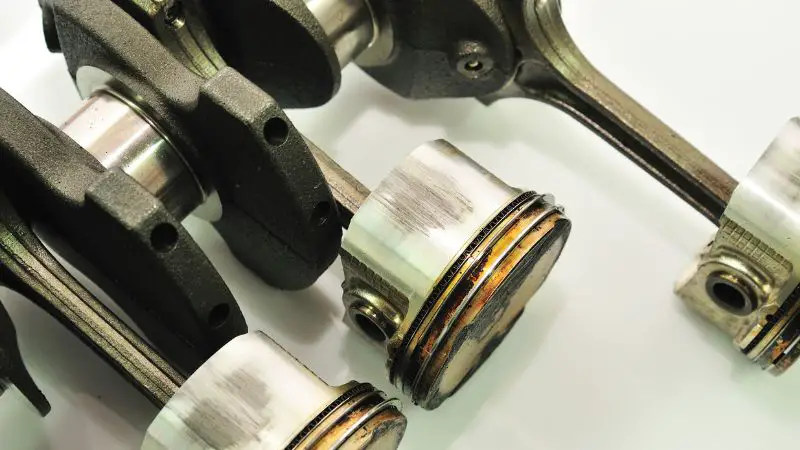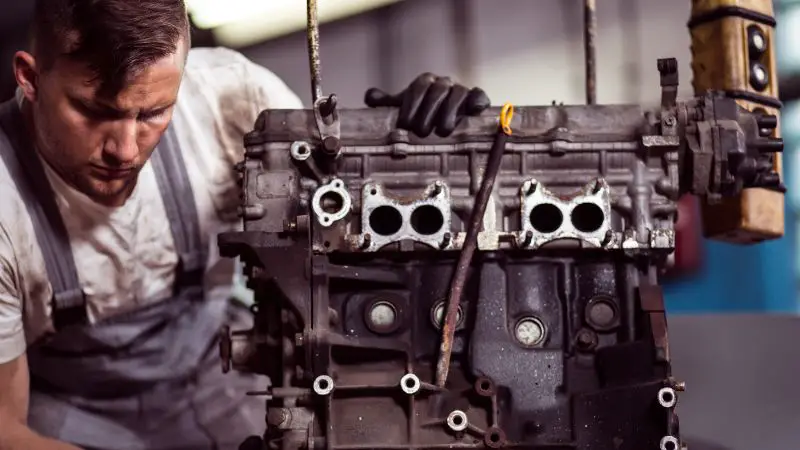Can an oil change fix an engine knock? Actually, it depends. Due to many reasons, there can be ticking and knocking sounds. If your oil level is low, you can likely hear a knocking, tickling sound from your engine. Also, adding oil will stop the noise if the noise comes from a valve or filter.
But if your oil level is OK and hearing the knocking sound, there may be another problem. In addition, if the sound comes from the rod, the oil can’t stop this knock. Besides this, if the engine has piston or bearing knocks, adding new oil won’t stop it. And you require rebuilding, so save your money on oil and repair it.
What Is Engine Knock and Rod Knock?
Knocking happens when the fuel in your engine burns unevenly. If everything is fine and the cylinder has the proper air and fuel mixture, these burn in a controlled manner. After each cylinder’s air/fuel mixture ignites, it will generate a small “shock wave” in your engine. You hear the engine knocking when these “shock waves” occur alternately and multiple times.
Rod knock refers to the noise of one or more connecting rods as it hits or rub against the crankshaft. Nonetheless, the metal bushing between the crank and the con rod over time can wear off, resulting in rod knock.

Causes of Engine Knocking:
Now that you know what engine knocking is let’s examine some reasons.
- Low Oil
Engine knocking from low oil is one of the most common causes. If your car is using more oil than usual, it’s a good idea to keep it topped up. It’s best to use a higher-quality oil because it will help decrease engine wear.
Yet, changing your oil regularly is crucial as dirty oil can also cause knocking. In this case, an oil change can fix the engine knocking. Even only adding oil.
- Old Spark Plugs
Another reason is old spark plugs. Spark plugs can knock the engine out for extra time to replace. Replacing this spark plug can help to solve the problem.
- Faulty Fuel Pump
A faulty fuel pump is also responsible for engine knocking. This is because a defective fuel pump cannot adequately supply fuel to the engine. When this occurs, the air/fuel mixture will become too rich, causing engine knock. So, if you notice a fuel pump problem, it’s a good idea to have it by a professional.
- Bad Gaskets or Seals
Gaskets and seals can prevent leaks in your engine. Typically, if these gaskets or seals are defective, it may cause the engine to knock. You can replace problems or take them to a mechanic when you notice problems.
- Damaged Piston
A damaged piston can also cause engineTheically, the damaged piston can’t correctly compress the air/fuel mixture, which can cause knocking. If your pistons might be damaged, it’s best to repair them immediately.
- Worn Out Engine Bearings
The problem of engine knocking can be the reason for worn engine bearings. A dull approach won’t be able to support the engine’s weight, causing it to knock. Replacing the bearing may solve the problem.
What’s The Reason for The Engine Knocking After an Oil Change?
A knocking sound after an oil change doesn’t seem right. Due to a lack of lubrication where the moving parts don’t receive enough oil for their smooth movement, this sound occurs.
A few different things can go wrong when changing the oil. Here are possible reasons for knocking noises after an oil change.
- Faulty Oil Filter
Poor circulation because of a faulty element can simulate the effects of low lubrication. If something doesn’t allow enough oil to be sent to the engine, your car can gasp for some people. The oil filter plays a crucial role in maintaining proper oil pressure.
Replacing the filter with the wrong one can reduce and sometimes increase oil pressure through the pump. Resulting in abnormal engine performance.
Check: Best Oil Filter In 2023: K&N Oil Filter Vs Mobil 1
- Worn Oil Pump
When new oil is poured into the engine, it’s usually heavier than the used fluid. Oil viscosity decreases gradually as the oil warms between moving components and decreases further with time and wear.
Although a weak oil pump might be OK with old oil, it’s challenging to circulate new oil through the system.
- Loose Oil Plug
Oil changes should be noticed if there is a proper drain plug at home. Although a partially loose oil plug may not show immediate symptoms, it may leak after a while. As a result, there can be ticking engine noise. The leak slowly causes the engine oil to drip. Also, it affects restricts the lubrication of engine elements and accelerates wear.
The drain plug is meant to clasp the oil in the oil pan under the vehicle. If the drain plug is not in place, its gravity will drain the oil.
Check: How To Remove An Over Tightened Oil Plug
- Ran Out of Oil Engine Knocking
If you don’t put oil in on time, engine moving parts lose their protection and wear out immediately. Due to lacking lubrication, each moving part slaps the other and produces a knocking sound.
If your car runs out of oil and refills it, but it’s knocking, that means significant damage. In this case, complete engine replacement is the only option, which will leave a hole in your wallet. If your car runs out of oil, your powerplant faces significant damage.
We recommend you check the oil level and keep it from going below the recommended level. Also, maintain oil change intervals recommended by your vehicle manufacturer.
How to Fix an Engine Knocking?
Can the engine knock be fixed? Why not? Every problem comes with a solution. So, if you face a knocking sound from your car’s engine, you should fix the issue as soon as possible. Below we give some fixing ways that you can follow:
Change oil and filter
First, if you’re struggling with a knocking engine problem, check to see if your car’s oil is still good. Yet, if the oil needs replacing, change it immediately and the oil filter. Meanwhile, use the recommended oil for your car and let your car cool before adding oil.
Oil leak repair
If you notice a leak around your car’s oil pan gasket, valve seal, etc., you should fix the leaks immediately. After that, immediately top up the engine oil to the recommended level.
Replace faulty oil pump
After finding the problem, please replace the component as soon as possible. If you discover that a faulty oil pump is responsible for low oil pressure, please replace it.
Replace defective oil pressure sensor
Finally, if a faulty oil pressure sensor causes the engine to knock, immediately replace it. Meanwhile, please consult a professional auto technician to resolve these issues to avoid severe engine damage.

Can an Oil Change Fix An Engine knocking?
Actually, it depends, if your oil level is low and hear ticking, or any unusual sound from the Valve you should check the oil level and oil condition. Then add oil or change the oil if the oil turns in dirty. Hopefully, the engine knock problem will be solved. But if there is rod knock or imperfect combustion you may need to change the gasoline or check for other causes of engine knock which already we discussed earlier.
FAQ (Frequently Asked Questions)
Q. Can overfilling oil cause engine knocks?
Theoretically yes. Increased oil can create enough crankcase pressure. Likewise, the effective octane will drop if lousy condition oil control rings let oil vapors through. For that, the engine will ping, and then the knock sensor will pick it up.
Q. How much does it cost to fix a rod knock?
Rod knock repairs will cost at least $2,500. A connecting rod repair on a few vehicles, such as a Subaru Forester, can cost $5,000 or more in materials and labor.
Connecting rod bearings take work to replace. The problematic element is first deep in the engine. You will need new engine gaskets, seals, connecting rod bearings, and cylinder head bolts.
Both cooler and machine lines need to be flushed. Sometimes, you will need new timing chains, camshafts, pistons, crankshafts, connecting rods, and piston rings. It may be wise to replace the engine due to the need for spare parts.
Q. Can an oil change stop engine from knocking?
Actually, it depends on the cause. If your engine is knocking because of low oil, you can fix the knocking sound with an oil change. But oil change can’t stop the sound if the sound comes from another component like a rod, combustion chamber, etc. Usually, after inspecting the problem, you should fix it as soon as possible.
Final Word
A pinging or knocking sound indicates that something inside your engine is malfunctioning. Ignoring a problem can lead to a more severe engine problem. Ergo, when you notice any unusual noises, you should check this. The article is Can an oil change fix an engine knock? We discuss this topic above correctly. We hope now you can know what’s the truth. Still, as you know, monitoring your engine regularly is a good idea.
The noise can vary from tapping, knocking, rattling, and pinging. The reasons can be as simple as lousy fuel, rod engine, carbon deposits, or mechanical problems in the engine requiring adjustment.
Read Also: Can Low Oil Cause A Misfire? Causes And Solutions
